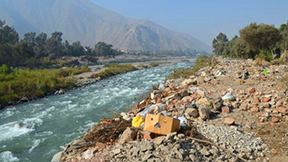The Knight Center for Environmental Journalism recently taught an online environmental journalism to a group of university students in Peru. This is one of the stories produced during that effort. The program was funded by the U.S. Embassy in Lima.
By Sebastián Ramírez
Alarming shortage of products revealed in public hospital
Is there anyone who has never been sick?
Some of us have had a fever at least once in our lives and we had to buy products to help us cope with our illness.
However, that is not the situation for all Peruvians who need to use products from public hospital pharmacies. Continue reading

 Time has passed and, far from improving, the situation has drastically worsened. Today the Lurin River is drastically polluted, and the cause of this problem is the presence of invaders.
Time has passed and, far from improving, the situation has drastically worsened. Today the Lurin River is drastically polluted, and the cause of this problem is the presence of invaders.